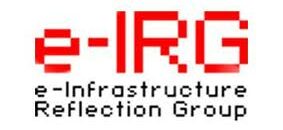Workplan
The e-IRGSP7 work plan has been designed in a lean way in line with the objectives and resources of the project. Overall, the project has four work packages,
which are subdivided into tasks. The horizontal work packages WP1 and WP4 deal with project management and dissemination, respectively. Furthermore, WP4 will
take care of the liaison with stakeholders. Work package WP2 provides secretarial support including the organisation of (internal) e-IRG delegates meetings and the open e-IRG workshops. Work package WP3 supports the policy-oriented activities of e-IRG. The number of Work Packages has been kept as small as possible with links across WPs and tasks in order to reduce project overhead. Through the engagement of most partners in more than one work package, knowledge and information exchange across the whole project is guaranteed. The partners of the consortium will discuss during the kick-off meeting whether a co-leader for each work package of the project is necessary and also the deputy project director will be nominated.
WP1 – Project Management provides efficient, effective, and timely overall management and coordination of the project. WP1 supervises the progress of all other work packages and their tasks, mitigates unexpected risks by eventually initiating corrective actions, and manages the resources of the project. WP1 organises an effective internal communication within the project and stimulates a coherent and consistent approach across the tasks. WP1 is responsible for timely communication with the European Commission and the Research Executive Agency.
WP2 – Secretariat provides the core secretarial services to the e-IRG Chair, the e-IRG Executive Board[1], the e-IRG delegates. The secretariat keeps minutes of all e-IRG and e-IRGSP7 meetings, produces reports of the e-IRG workshops and outreach events, and manages the mailing lists and the content of the e-IRG website. WP2 assists the hosting country of the EU presidency with the organisation of the delegate meetings and the workshops.
WP3 – Policy Support supports the creation of all policy documents of e-IRG towards the implementation of EOSC and the digital transformation of the ERA. This may include White Papers, Roadmaps, Recommendations, Working Group and Task Force reports, or other more specific documents with relation to the overall e-Infrastructure landscape. Support for publication and dissemination of the policy documents will be provided by WP4. WP3 will closely follow the e-Infrastructure developments in EOSC but also other areas such as GÉANT, EuroHPC and the ERA related groups, keeping track of the developments at national and European levels, so that policy gaps and actions are identified. The aim of the tracking activities is to be informed about policy developments and provide background information to the delegates and the policy document editors.
WP4 – Dissemination, Liaison and Communication reaches out to external stakeholders and creates awareness of the activities of e-IRG. A major task for WP4 is the dissemination of e- IRG’s policy documents. WP4 further produces information material and disseminates it both directly, through a dedicated website, and at European and international events. WP4 maintains the e-IRG social media activities, with emphasis on Twitter. Furthermore, WP4 provides support for the liaison between e-IRG and relevant stakeholders such as EOSC, ESFRI and ERA-related groups, along with other e-Infrastructure and research infrastructure initiatives and stakeholders.
![]() e-IRGSP7 has received funding from the European Union’s Horizon Programme call HORIZON-INFRA-2021-DEV-01-05, Grant Agreement number 101057802.
e-IRGSP7 has received funding from the European Union’s Horizon Programme call HORIZON-INFRA-2021-DEV-01-05, Grant Agreement number 101057802.
